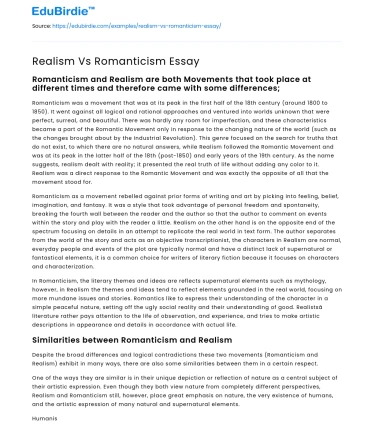Romanticism and Realism are both Movements that took place at different times and therefore came with some differences;
Romanticism was a movement that was at its peak in the first half of the 18th century (around 1800 to 1850). It went against all logical and rational approaches and ventured into worlds unknown that were perfect, surreal, and beautiful. There was hardly any room for imperfection, and these characteristics became a part of the Romantic Movement only in response to the changing nature of the world (such as the changes brought about by the Industrial Revolution). This genre focused on the search for truths that do not exist, to which there are no natural answers, while Realism followed the Romantic Movement and was at its peak in the latter half of the 18th (post-1850) and early years of the 19th century. As the name suggests, realism dealt with reality; it presented the real truth of life without adding any color to it. Realism was a direct response to the Romantic Movement and was exactly the opposite of all that the movement stood for.
Romanticism as a movement rebelled against prior forms of writing and art by picking into feeling, belief, imagination, and fantasy. It was a style that took advantage of personal freedom and spontaneity, breaking the fourth wall between the reader and the author so that the author to comment on events within the story and play with the reader a little. Realism on the other hand is on the opposite end of the spectrum focusing on details in an attempt to replicate the real world in text form. The author separates from the world of the story and acts as an objective transcriptionist, the characters in Realism are normal, everyday people and events of the plot are typically normal and have a distinct lack of supernatural or fantastical elements, it is a common choice for writers of literary fiction because it focuses on characters and characterization.
Save your time!
We can take care of your essay
- Proper editing and formatting
- Free revision, title page, and bibliography
- Flexible prices and money-back guarantee
In Romanticism, the literary themes and ideas are reflects supernatural elements such as mythology, however, in Realism the themes and ideas tend to reflect elements grounded in the real world, focusing on more mundane issues and stories. Romantics like to express their understanding of the character in a simple peaceful nature, setting off the ugly social reality and their understanding of good. Realistsâ literature rather pays attention to the life of observation, and experience, and tries to make artistic descriptions in appearance and details in accordance with actual life.
Similarities between Romanticism and Realism
Despite the broad differences and logical contradictions these two movements (Romanticism and Realism) exhibit in many ways, there are also some similarities between them in a certain respect.
One of the ways they are similar is in their unique depiction or reflection of nature as a central subject of their artistic expression. Even though they both view nature from completely different perspectives, Realism and Romanticism still, however, place great emphasis on nature, the very existence of humans, and the artistic expression of many natural and supernatural elements.
Humanism, modernism, and naturalism were also common elements of realist and romantic arts. The freedom of humans, the construction of contemporary human life, and the admiration of nature and human art forms were the primary focus of both artistic styles.
The rejection of classicism and other forerunner movement is another similarity between these two movements.
Romanticism was an artistic and intellectual movement that took place in Europe between the late eighteenth and mid-nineteenth centuries, it was understood broadly as a break from the guiding principles of enlightenment which established reason as the foundation of all knowledge. The Romantic Movement emphasized the importance of emotional sensitivity and individual subjectivity. For the Romantics, imagination, rather than reason was the most important creative faculty, it was displayed in literature, art, music, and mindset. Romanticism has very little to do with things popularly thought of as 'romantic', although love may occasionally be the subject of Romantic art, rather it is an international artistic and philosophical movement that redefined the fundamental ways in which the people in the Western cultures thought about themselves and about their world. Romanticism also emerged as a response to the disillusionment with the enlightenment values of reason and order in the aftermath of the French Revolution of 1789, it is also often posited in the opposition to Neoclassicism. It can also be concluded that Romanticism was a revolution in the arts, alongside the political, social, and industrial revolutions of the age.






 Stuck on your essay?
Stuck on your essay?

